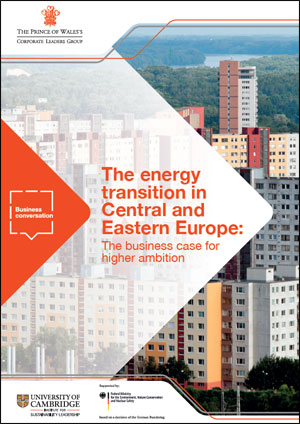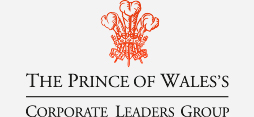March 2019 – The transition towards a zero carbon economy provides Central and Eastern Europe (CEE) with significant opportunities to deliver better public health, improved quality of life and economic prosperity, as well as positive climate outcomes. This new report from The Prince of Wales’s Corporate Leaders Group (CLG) explores the emerging economic opportunities and challenges relating to the transition to low carbon, resource efficient economies in three core areas: energy efficiency in buildings, renewable energy, and mobility. It puts forward recommendations for companies and governments in the region to address the current challenges and fully realise the economic opportunities of the energy transition.
 In most CEE countries, the building sector accounts for a bigger share of total energy use than the European average. Thus, energy efficiency interventions in the building stock in these countries could result in proportionally greater benefits.
In most CEE countries, the building sector accounts for a bigger share of total energy use than the European average. Thus, energy efficiency interventions in the building stock in these countries could result in proportionally greater benefits.
Similarly, the rapid expansion in the market for renewable technologies globally over the last decade (particularly in solar and wind technologies) has created new, economically viable opportunities which the CEE region can capitalise on.
The extensive, socialist-era public transport network across many CEE countries offers the foundation for a yet more efficient service with more investment, better economic growth and phase-out of high polluting, older vehicles. There is also a strong interest in expanding electric mobility in the region.
This report from The Prince of Wales’s Corporate Leaders Group explores the emerging opportunities and challenges relating to the ongoing energy transition in these three core areas: energy efficiency in buildings, renewable energy, and mobility. It examines the context of the region’s historical heritage and current social, political and economic factors, drawing on inspiring examples of business innovation that are showing what is possible. It offers recommendations for both business and policymakers, highlighting how both sets of actors can support from the energy transition.
The report is based on desk research and interviews with 20 companies and organisations that are operating in CEE.
It sets out recommendations for both businesses and governments, based on research showing opportunities for new financial products and services that reduce the cost barrier for consumers, and new technological solutions tailored to the region.
Beyond this, businesses leading by example through decarbonising their own operations in the region can trigger broader deployment of renewables and climate ambition locally.
The report calls on governments to outline long-term climate plans necessary to provide the stable regulatory environment that can attract commitment from investors and finance infrastructure improvements that can support private sector innovation.
The energy transition in Central and Eastern Europe: The business case for higher ambition is the fifth instalment of the CLG business conversation series with the aim of stimulating policy debate and leading positive change among politicians, policymakers and businesses, all of whom have a pivotal role to play in accelerating the energy transition in Europe. The series is based on desk research and interviews with businesses, and previous reports examined:
- the role of renewables in Europe (April 2017)
- new models for resource productivity for European industry (September 2017)
- the future of road transport in Europe (November 2017)
- renovation with the aim to make Europe’s homes fit for the 21st century (April 2018).
Participants
The report is based on interviews with senior representatives of the following companies and organisations:
CEE Bankwatch Network, Center of Energy Efficient Solutions (CER), Czech Biomass Association, EFdeN, Estonian Renewable Energy Association, GreenGo Car Europe, Green Policy Institute Bulgaria, Knauf Insulation, KODIS, Krakow Road and Transport Authority, KredEx Estonia, MOL Limitless Mobility, Oszkar.com, Regional Centre for Energy Policy Research, ROCKWOOL Group, Romanian Renewable Energy Association, Signify, Slovak Association of Photovoltaic Industry, Solar Solutions, Tesco PLC, VELUX.
Citing this report
Please refer to this publication as University of Cambridge Institute for Sustainability Leadership (CISL). (2019). The energy transition in Central and Eastern Europe: The business case for higher ambition. Cambridge, UK: The Prince of Wales’s Corporate Leaders Group.





